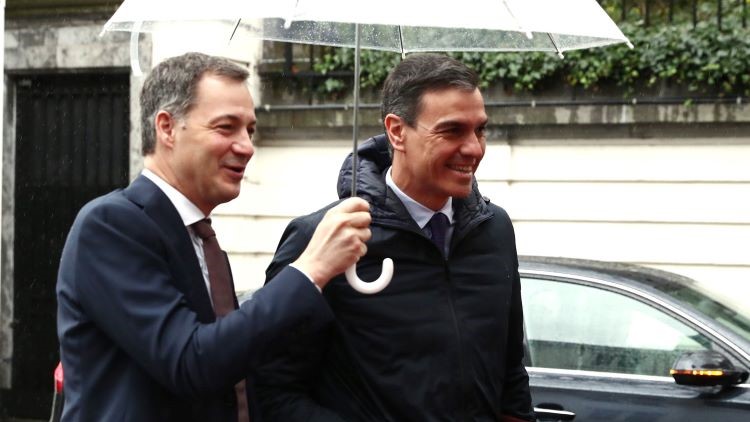Eduardo González
The President of the Government, Pedro Sánchez, held a working breakfast yesterday in Brussels with the Belgian Prime Minister, Alexander De Croo, with whom he discussed, among other issues, the reform of the electricity market and the priorities of the next two Presidencies of the EU Council, which will correspond, successively, to Spain and Belgium.
The working breakfast took place within the framework of the meetings that the President of the Government is holding with his European counterparts in preparation for the Spanish Presidency of the Council of the EU, which will begin on July 1st.
In this case, in addition, Belgium will be the next country to assume the Presidency, from January 1, 2024 (the other country of the current trio of presidencies is Hungary, in the second half of 2024), so both leaders stressed the importance of joining efforts to achieve maximum coordination between the two countries and agreed that support for Ukraine will continue to be paramount in both Presidencies, as reported by Moncloa in a press release.
President Sánchez and his counterpart also discussed open strategic autonomy and agreed on the need to develop critical capabilities and limit dependence on Europe in supply chains. Likewise, according to Moncloa, the two leaders maintained “a constructive position” on the challenges Europe faces in terms of competitiveness and highlighted, in this regard, the relevance of the reform of the electricity market with a view to building a resilient and competitive Europe.
According to Moncloa sources, Sánchez’s initial objective was to meet this week with his Benelux counterparts (the Netherlands, Luxembourg and Belgium itself) as part of his European tour to prepare for the EU Presidency, but the motion of censure debated in Congress made it impossible. Therefore, taking advantage of the presence of the President of the Government in the Belgian capital on the occasion of the meeting of the European Council, it was finally decided to schedule this meeting with Alexander De Croo. The same sources indicated that both countries have many points in common regarding issues such as the reform of the electricity market, open strategic autonomy, the Migration Pact or relations with third parts of the world, such as Latin America.
Germany and the electricity market
In addition, Pedro Sánchez met yesterday with the German Chancellor, Olaf Scholz, within the framework of the European Council. On February 9, a group of seven countries led by Germany sent a letter to the European Commission in which it called for a limited reform of the electricity market that would maintain the benefits reported by the system in the last decade, an approach contrary to that of countries such as Spain. The letter was also signed by Denmark, the Netherlands, Finland, Luxembourg, Latvia and Estonia.
Pedro Sánchez has made two tours so far this year to prepare for the Spanish Presidency. The first took place in mid-February, when he traveled to Austria, Croatia and Slovenia. In Austria, Sánchez and the Federal Chancellor, Karl Nehammer, agreed on the need to achieve “affordable energy prices for households and companies”; in Croatia, Sánchez defended before the Prime Minister, Andrej Plenkovic, the need to “continue to make progress in the reform of the electricity market”; and in Slovenia, the President of the Government obtained the support of the Prime Minister, Robert Golob, for his proposal to reform the energy market.
At the beginning of March, Pedro Sánchez made a second tour of Ireland and two of the signatory countries of the charter led by Germany: Denmark and Finland. In Ireland, the President of the Government made a commitment to the Prime Minister, Leo Varadkar, to speed up, during the Spanish Presidency of the EU, an “agile and balanced” implementation of the Windsor agreement between the European Commission and the British Government on the Northern Ireland Protocol. In Denmark, Sánchez and the Prime Minister, Mette Frederiksen, signed a collaboration agreement on green transition and addressed, among other issues, the Migration and Asylum Pact, European strategic autonomy and the improvement of European competitiveness. Finally, in Finland, Pedro Sánchez discussed open strategic autonomy and was thanked by the Prime Minister, Sanna Marin, for “her unconditional support” for Finland’s accession to NATO.







